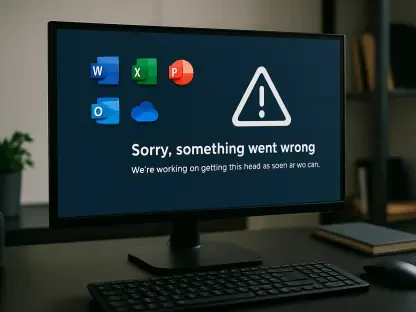In an era where mobile devices are as essential to work as laptops once were, a startling vulnerability has emerged in the cybersecurity landscape, demanding urgent attention. Verizon Business, through its latest Mobile Security Index (MSI), has uncovered a dangerous oversight in enterprise security: the rampant use of personal mobile phones for professional tasks without adequate protection. This gap, often dismissed by both employees and organizations, is fueling a wave of preventable data breaches that jeopardize sensitive data and corporate networks. As remote and hybrid work environments continue to dominate, personal devices blur the lines between private and professional spheres, creating an expansive attack surface for cybercriminals. The urgency to address this blind spot cannot be overstated, as the consequences of inaction ripple across industries, exposing companies to financial loss and reputational damage. This critical issue demands immediate action, with solutions within reach yet frustratingly underutilized in many sectors.
Rising Threats in the Mobile Landscape
User Misconceptions and Risky Behaviors
A pervasive myth among employees is that mobile devices are somehow immune to cyber threats, a belief that fosters dangerous habits with severe implications. Many users store sensitive information, such as passwords or corporate login details, in unsecured applications like personal note-taking tools, assuming their phones are safe from prying eyes. This misplaced trust extends to interactions with unknown links or messages, where individuals often click without hesitation, unaware of the potential for malware or phishing traps. Verizon’s findings highlight how this casual attitude significantly heightens risks, especially as personal phones are increasingly used for work tasks. The lack of basic caution among users transforms these devices into gateways for attackers seeking access to broader organizational systems, amplifying the potential for widespread data breaches.
Beyond individual habits, the integration of personal devices into professional settings has dramatically expanded the scope of vulnerabilities that cybercriminals can exploit. With remote work setups becoming the norm, employees frequently access corporate emails, documents, and networks directly from their smartphones, often without any oversight or security protocols in place. Unlike company-issued laptops, which typically come with pre-installed safeguards, personal phones lack such defenses, making them easy targets for sophisticated attacks. Verizon’s report underscores that this unchecked reliance on personal technology, combined with a general underestimation of mobile risks, creates a perfect storm for data compromise. The challenge lies in shifting user mindsets to recognize that mobile devices require the same vigilance as traditional IT equipment, a cultural change that remains elusive for many organizations.
The Surge of Smishing Attacks
Among the most concerning trends identified by Verizon is the sharp rise of smishing—phishing attacks delivered via text messages—that capitalize on users’ inherent trust in SMS communications. Unlike email phishing, which many have learned to scrutinize, text messages often carry an air of authenticity, prompting recipients to act without suspicion. Cybercriminals exploit this by crafting urgent or personalized messages that lure users into clicking malicious links or divulging sensitive information. The MSI data paints a grim picture, revealing that 80% of surveyed organizations encountered smishing attempts targeting their employees. This statistic highlights how pervasive and effective this method has become, catching even cautious individuals off guard due to the immediacy and perceived legitimacy of text-based outreach.
Equally troubling is the widespread lack of employee awareness and preparedness to counter smishing threats, as evidenced by simulation results from Verizon’s research. When companies conducted tests to gauge staff recognition of fraudulent texts, the outcomes were disheartening: in 40% of organizations, between 25% and 50% of employees failed to identify the scams, while in 9% of cases, over half were deceived. These figures point to a critical gap in training and education specific to mobile threats, leaving workforces vulnerable to attacks that could compromise entire systems. The need for targeted programs to teach recognition of smishing tactics is evident, as traditional cybersecurity training often overlooks the nuances of mobile-based deception. Addressing this shortfall could significantly reduce the success rate of such attacks and bolster overall organizational resilience.
Gaps in Corporate Mobile Defense Strategies
Disparity in Security Investments
A striking imbalance exists in how organizations allocate resources to secure different types of technology, with mobile devices often receiving far less attention than traditional IT infrastructure. Laptops, desktops, and servers typically benefit from comprehensive monitoring, advanced telemetry, and robust endpoint protection, reflecting years of investment in safeguarding these assets. In contrast, mobile security remains a low priority for many companies, despite the growing role of smartphones in daily operations. Verizon’s insights reveal that this neglect results in longer detection times for mobile-related incidents and greater challenges in mitigating breaches once they occur. The disparity creates a weak link in corporate defenses, one that attackers are quick to exploit as mobile usage continues to soar across industries.
Compounding this issue is the limited distribution of work-issued mobile devices, which leaves personal phones as the primary tools for many employees engaging in professional tasks. Data indicates that only a small fraction of companies provide smartphones to all staff, with less than half offering them to select personnel. As a result, personal devices—often devoid of corporate oversight or security software—bear the brunt of mobile cyberattacks, accounting for 70% of reported incidents in Verizon’s findings. This reliance on uncontrolled hardware underscores the urgent need for organizations to either expand the provision of secure, work-specific devices or implement stringent policies for personal phone usage. Without such measures, the vulnerability gap will persist, exposing companies to risks that could be mitigated with proactive investment and planning.
Challenges Beyond Personal Devices
Even when organizations provide work-issued phones, significant security challenges remain, particularly due to the nature of mobile device usage outside conventional work settings. Employees often carry these devices during off-hours, on weekends, or during vacations, times when they may be less vigilant or more distracted. Verizon points out that such scenarios increase susceptibility to attacks, as users might respond to suspicious messages or access unsecured networks without the usual workplace safeguards in mind. This constant accessibility of mobile devices, unlike stationary IT equipment, means that threats can strike at any moment, often catching individuals off guard when their defenses are down, thereby heightening the likelihood of a successful breach.
Additionally, the lack of a controlled environment for work phones amplifies the difficulty of enforcing consistent security practices across all usage scenarios. Unlike office-based systems, where network protections and monitoring are standard, mobile devices frequently connect to public Wi-Fi or other unsecured networks, creating entry points for cybercriminals. Verizon emphasizes that a comprehensive security approach must account for these variables, ensuring that policies and tools cover both personal and professional devices at all times. Without addressing the unique risks posed by mobile usage in diverse contexts, organizations remain exposed to threats that exploit the mobility and round-the-clock nature of smartphone engagement. A holistic strategy is essential to close these gaps and protect against evolving dangers.
Pathways to Strengthen Mobile Security
Proven Strategies and Their Impact
Amid the mounting risks, Verizon identifies actionable solutions that can significantly bolster mobile security and reduce the incidence of data breaches. The MSI outlines eight key practices, including regular risk analyses, adoption of zero-trust philosophies, and implementation of mobile device management (MDM) systems. These strategies aim to create a layered defense that addresses vulnerabilities at multiple levels, from user behavior to device configuration. Data from the report shows compelling results: companies that adopt all recommended practices are half as likely to experience breaches causing system downtime, with only 24% affected compared to 46% of those without such measures. This stark contrast highlights the tangible benefits of a proactive stance on mobile security, offering a clear path forward for organizations willing to commit.
Further analysis reveals that the impact of comprehensive mobile security extends beyond mere prevention of downtime to minimizing severe repercussions from breaches. Organizations fully implementing these best practices face major consequences in only 12% of cases, a sharp drop from 63% among those with incomplete or absent strategies. This evidence underscores the effectiveness of a structured approach that integrates technical tools with policy frameworks to safeguard mobile environments. For many companies, the challenge lies not in the availability of solutions but in recognizing their necessity before a crisis strikes. Verizon’s findings serve as a compelling reminder that investing in these proven methods can transform mobile devices from liabilities into secure assets, protecting both data and operational integrity in an increasingly connected world.
Overcoming Adoption Barriers
Despite the demonstrated success of mobile security solutions, a significant hurdle remains in their widespread adoption, often due to a lack of awareness or misallocation of resources within organizations. Many companies fail to prioritize mobile protection, viewing it as secondary to traditional IT investments, even as mobile threats outpace other attack vectors in frequency and impact. This oversight frequently stems from underestimating the scale of risks associated with smartphones or assuming existing measures are sufficient. Verizon’s report calls for a shift in perspective, urging leaders to recognize mobile security as a critical component of their overall cybersecurity posture, rather than an optional add-on that can be deferred until a breach forces action.
Moreover, addressing adoption barriers requires tackling systemic issues such as budget constraints and insufficient training, which often prevent organizations from implementing necessary safeguards. Allocating resources to mobile security initiatives, while challenging in the short term, yields long-term benefits by averting costly incidents and preserving trust with stakeholders. Verizon advocates for increased education at all levels, ensuring that both executives and employees understand the stakes involved. By fostering a culture of accountability and equipping teams with the tools to counter mobile threats, companies can bridge the gap between awareness and action. The urgency to overcome these obstacles cannot be ignored, as the evolving nature of cyber risks demands swift and decisive steps to protect against the next wave of mobile-driven breaches.









